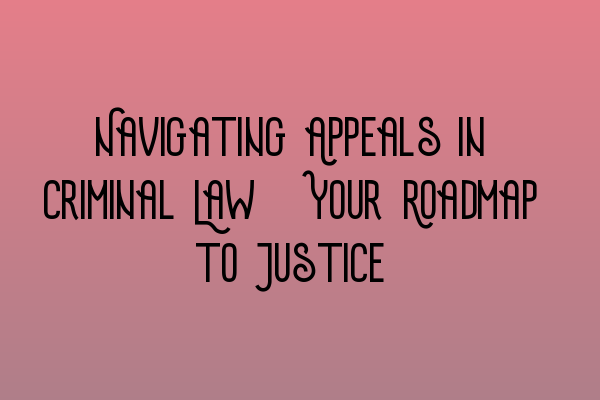Navigating Appeals in Criminal Law: Your Roadmap to Justice
When you are involved in a criminal case, your freedom and reputation are on the line. In such situations, ensuring that you receive a fair trial with proper legal representation is of utmost importance. However, even after a trial, there may be instances where you feel that justice has not been served. This is where appeals come into play.
Understanding Appeals in Criminal Law
An appeal is a legal procedure that allows you to challenge a court’s decision in a higher court. It gives you the opportunity to have your case reviewed by a different set of judges, who will re-evaluate the evidence and legal arguments presented. This provides a chance to correct any errors or unfairness that may have occurred during the initial trial.
Appeals can be complex and require a thorough understanding of the legal process. It is crucial to seek the guidance of a competent criminal law solicitor who specializes in appeals. They can assess the viability of your appeal, guide you through the necessary steps, and represent your interests effectively.
The Appeals Process
The appeals process typically involves the following steps:
- Filing a Notice of Appeal: This formal document notifies the court and the opposing party that you intend to challenge the decision. It must be filed within a specified time frame, usually within a few weeks after the trial verdict.
- Grounds for Appeal: A crucial aspect of the appeals process is identifying valid reasons to challenge the court’s decision. These grounds may include errors in the application of the law, procedural irregularities, or new evidence that could significantly impact the case.
- Preparing the Appellate Brief: An appellate brief is a comprehensive written argument that presents your case to the higher court. It includes a summary of the trial proceedings, legal analysis, and references to relevant case law to support your arguments.
- Oral Arguments: In some cases, the higher court may allow oral arguments where you, your solicitor, or barrister present your case in person. This presents an opportunity to address any questions the judges may have and further strengthen your appeal.
- Court’s Decision: After reviewing the documents and hearing the oral arguments, the higher court will make a decision. They may uphold the lower court’s decision, modify it, order a retrial, or even overturn the verdict altogether. The outcome of the appeal depends on the merits of your case, quality of representation, and the judges’ interpretation of the law.
Navigating the appeals process can be intricate, but it is crucial to engage a solicitor with expertise in criminal appeals to maximize your chances of success. At SQE Criminal Law & Practice Law UK, we have a team of experienced solicitors who are well-versed in the appeals process and can provide you with the guidance and representation you need.
Why Choose SQE Criminal Law & Practice Law UK?
At SQE Criminal Law & Practice Law UK, our dedicated solicitors have a proven track record of success in handling appeals in criminal law cases. We understand the intricacies of the appeals process and can strategically analyze your case to identify strong grounds for appeal.
We specialize in providing personalized and comprehensive legal advice, tailored to your unique circumstances. Our expertise extends to various areas of criminal law, including:
- White-collar crimes
- Drug offences
- Assault and battery
- Homicide
- Sexual offenses
- And more
With our in-depth knowledge and experience in criminal law, we can effectively argue your case before the higher courts, presenting compelling evidence and legal arguments to support your appeal.
If you have questions or concerns about navigating the appeals process in criminal law, we are here to help. Contact us today to schedule a consultation with one of our experienced solicitors.
Related Articles:
- SQE 1 Practice Exam Questions
- SQE 1 Practice Mocks FLK1 FLK2
- SQE 2 Preparation Courses
- SQE 1 Preparation Courses
- SRA SQE Exam Dates
